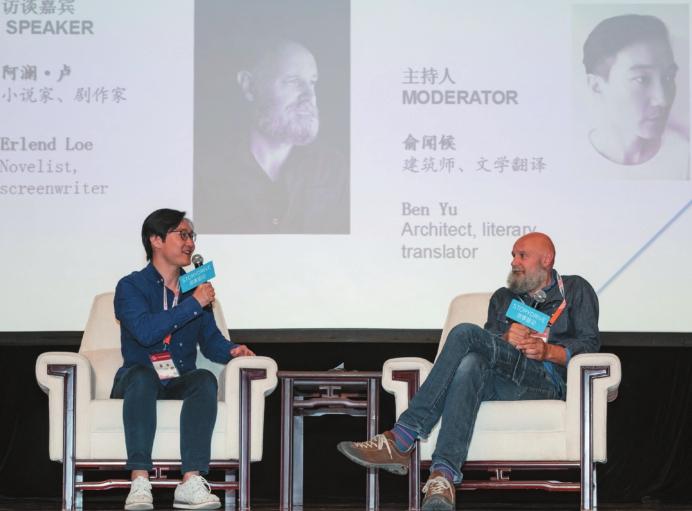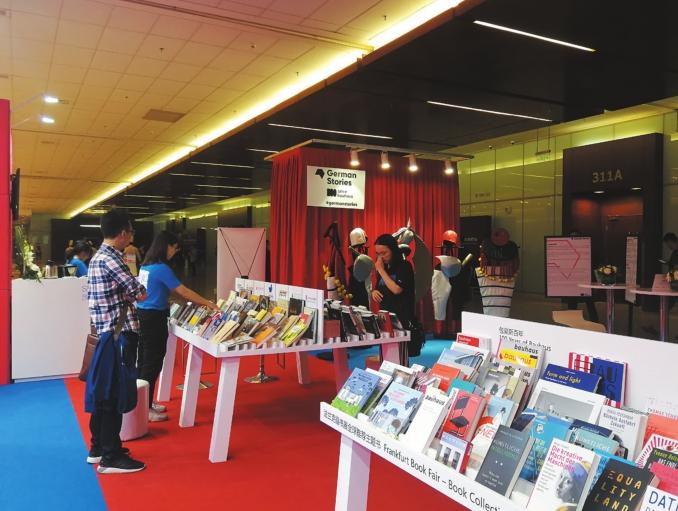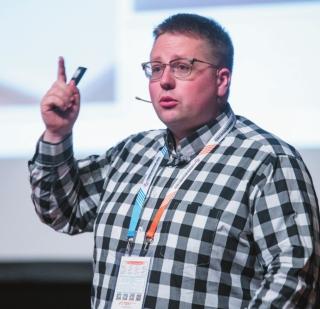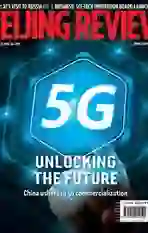Creative Liaisons
2019-06-24ByJiJing
By Ji Jing
‘If I hadnt gotten on a plane to China sev- eral years ago, I wouldnt be able to share my story with you today in a language that was totally unfamiliar to me back then,”Thomas Derksen, a 31-year-old from Germany, said at the StoryDrive Exhibition and Conference in Beijing on June 1.
The seventh edition of the event ran from May 28 to June 1, with the theme The Future of Culture and a special focus on artificial intelligence, trans-cultural storytelling and science fiction. StoryDrive is an all-media platform co-organized by the Frankfurt Book Fair and its subsidiary the German Book Information Center in Beijing and is dedicated to exploring new forms of collaboration and business models across media boundaries.
Sharing the laughs
Derksen, whose Chinese name is Afu meaning auspiciousness in Chinese, has become an Internet celebrity on Chinese social media platforms with his humorous video blogs.
Hailing from a village in Cologne, Afu worked at a local bank for three years before he began to study East Asian politics and economics as his university major with Chinese language as an optional course. He later went to Fudan University in Shanghai on an exchange program to learn Chinese, where he fell in love with a Chinese woman who he married in 2015.
In 2016, Afu made a short video introducing German vegetables to a Chinese audience and posted it on Bilibili, a Chinese online video platform.

Several days later, he posted a second video about how it feels to be married to a Chinese woman, where he played multiple roles including his mother- and father-in-law as well as his wife in a joking way to share his experience as a foreign son-in-law in China. The short video went viral, prompting Afu to start a career as a short video blogger in China.
His videos cover topics such as Chinese and German cuisines, languages and living habits. For instance, he showed how Christmas is celebrated in Germany. Afu speaks fluent Chinese in these videos with English subtitles so Germans who know English can also understand the videos.
He is regarded as a folk ambassador between China and Germany, even accompanying German President Frank-Walter Steinmeier to several Chinese cities during the latters visit last December.
He is also invited to be a guest on talk shows every time he returns to Germany to talk about China and his life in the country.
“Although China and Germany enjoy a close relationship today, many in Germany still know little about China. With my limited influence, I hope to change my fellow Germans impression of China by sharing my experiences in China,”Afu said at the conference.
“We should talk of each other, not about each other,” he added.
Epic science fiction
Sebastian Pirling, science fiction and fantasy literature editor at Heyne Publishing House in Munich, Germany, has contributed in his own way to China-Germany cultural exchanges by publishing renowned Chinese science fiction writer Liu Cixin in German.
He admitted at the conference that for many years, publishers in Germany didnt even know that Chinese science fiction existed. It only started to change when Lius The ThreeBody Problem was translated into English in 2014.
Realizing that the trilogy was immensely popular both in China and the rest of the world, Pirling got in contact with Lius Chinese agent and in about two or three months, his publishing house got the license to translate the series.
“With that step, our adventure into Chinese science fi ction in Germany began. And Im very happy that we started it because its loads of fun not only for me as an editor but also for us as a publisher,” he said.
He explained how they did certain things to draw a German readership. For example, they copied the cover design of the English edition rather than the Chinese edition because they felt many of their readers would relate more to the English-speaking world. In addition, they translated from the Chinese version to German rather than from the English version to German, which would have been much easier because they wanted to “give our German readers as much authentic and close to an original reading experience as we could,” Pirling said. In contrast to the English edition where many metaphors and idioms from the original Chinese version got shortened or cut out altogether, they chose to keep them because “we wanted the fl ow of the text to be very smooth,” he added.
The German edition of the trilogy has sold 150,000 copies, which is a fi rst for a science fi ction series published in Germany. Pirling insisted, however, that this was just the beginning for his publishing house.
“Im curious to see what else we can bring to a German readership from Chinese popular fi ction, especially from Chinese science fi ction that gives new perspectives on humanity,” he said.
Making connections
Ben Yu, a Chinese architect and literary translator living in Bergen, Norway, shared his experience of cross-cultural exchanges at the conference.
Born in Shanghai, Yu studied architecture at Shanghai Tongji University and has been working in Norway for more than 10 years.
He learned Norwegian during his first years in the country and has translated several Norwegian novels into Chinese, including Naiv. Super. by Erlend Loe and Beatles by Lars Saabye Christensen.
In 2016, he co-founded Northing, a multi-functional organization with a focus on publication, design, cultural events and communication.
Yu told Beijing Review that he saw cultural exchange between China and Norway as his calling, something that will benefi t both countries in the future.
He noted he has found many qualities and mindsets worth learning from in Norway through his cooperation with Norwegian artists, such as their intimate relationship with nature, the appreciation of imperfections in their artistic works and the simplicity of their lifestyles.
In addition to organizing projects with artists from both countries, Northing has established a publishing house named Kinakaal, meaning Chinese cabbage in Norwegian.

The first book published by Kinakaal was titled Elsewhere, which is a comic book co- authored by Norwegian Fredrik Rysjedal and Chinese Wang Shuo, who are both the only PhD holders in comic art in their respective countries. The two had an artistic dialogue by drawing comic book stories on four topics to show the differences between the two cultures.
Although Yu has done many projects to introduce Norwegian culture to Chinese people, he hasnt had much experience exporting Chinese culture back to Norway due to the complexity and scale of Chinese culture.
Yu lamented that many Norwegians have formed a stereotypical image of Chinese culture and society through one or two trips or events without digging into the countrys thousands of years of history and its immense cultural and ethnic diversity resulting from the vast expanse of its territory.
“Although I was born, grew up and received my education in China, I dare not say that I know the country 100 percent,” he added.
He suggested Chinese culture be introduced to Norway in intimate ways such as personal stories. One should not draw conclusions based on one-sided viewpoints like the blind man in an ancient Chinese parable who concluded what an elephant was by touching only a part of it, he said. Instead, Norway and other Western countries should listen to more stories of China from various perspectives to gather more information and have a more thorough understanding.

“I think the most effective way is to invite open-minded and influential Norwegian artists, designers and writers to visit China, to see the development and diversity for themselves. Everyone who has joined our projects has been deeply impressed by what they have seen during their stay in China. We will continue this kind of exchange through cultural events and publications.”
